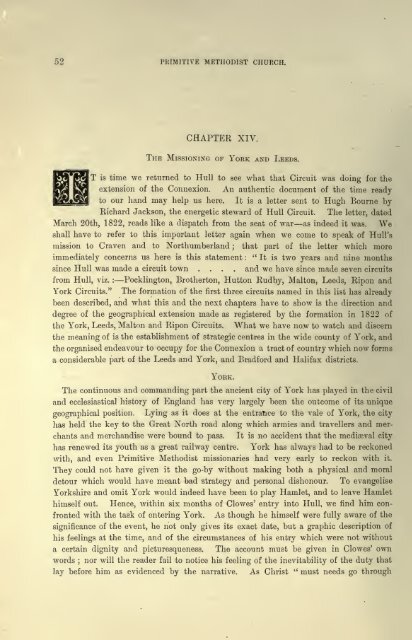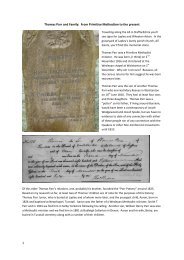Vol 2, pages 1-100 - My Primitive Methodist Ancestors
Vol 2, pages 1-100 - My Primitive Methodist Ancestors
Vol 2, pages 1-100 - My Primitive Methodist Ancestors
Create successful ePaper yourself
Turn your PDF publications into a flip-book with our unique Google optimized e-Paper software.
52 PRIMITIVE METHODIST CHURCH.<br />
CHAPTER XIV.<br />
THE MISSIONING OF YORK AND LEEDS.<br />
IT is time we returned to Hull to see what that Circuit was doing for the<br />
extension of the Connexion. An authentic document of the time ready<br />
to our hand may help us here. It is a letter sent to Hugh Bourne by<br />
Richard Jackson, the energetic steward of Hull Circuit. The letter, dated<br />
March 20th, 1822, reads like a dispatch from the seat of war as indeed it was. We<br />
shall have to refer to this important letter again when we come to speak of Hull's<br />
mission to Craven and to Northumberland ;<br />
that part of the letter which more<br />
immediately concerns us here is this statement : " It is two years and nine months<br />
since Hull was made a circuit town .... and we have since made seven circuits<br />
from Hull, viz. :<br />
Pocklington, Brotherton, Hutton Rudby, Malton, Leeds, Ripon and<br />
York Circuits." The formation of the first three circuits named in this list has already<br />
been described, and what this and the next chapters have to show is the direction and<br />
degree of the geographical extension made as registered by the formation in 1822 of<br />
the York, Leeds, Malton and Ripon Circuits. What we have now to watch and discern<br />
the meaning of is the establishment of strategic centres in the wide county of York, and<br />
the organised endeavour to occupy for the Connexion a tract of country which now forms<br />
a considerable part of the Leeds and York, and Bradford and Halifax districts.<br />
YORK.<br />
The continuous and commanding part the ancient city of York has played<br />
in the civil<br />
and ecclesiastical history of England has very largely been the outcome of its unique<br />
geographical position. Lying as it does at the entratice to the vale of York, the city<br />
has held the key to the Great North road along which armies and travellers and merchants<br />
and merchandise were bound to pass. It is no accident that the mediaeval city<br />
has renewed its<br />
youth as a great railway centre. York has always had to be reckoned<br />
with, and even <strong>Primitive</strong> <strong>Methodist</strong> missionaries had very early to reckon with it.<br />
They could not have given it the go-by without making both a physical and moral<br />
detour which would have meant bad strategy and personal dishonour. To evangelise<br />
Yorkshire and omit York would indeed have been to play Hamlet, and to leave Hamlet<br />
himself out.<br />
Hence, within six months of Clowes' entry into Hull, we find him con-<br />
As though he himself were fully aware of the<br />
fronted with the task of entering York.<br />
significance of the event, he not only gives its exact date, but a graphic description of<br />
his feelings at the time, and of the circumstances of his entry which were not without<br />
a certain dignity and picturesqueness. The account must be given in Clowes' own<br />
words ;<br />
nor will the reader fail to notice his feeling of the inevitability of the duty that<br />
lay before him as evidenced by the narrative. As Christ " must needs go through



